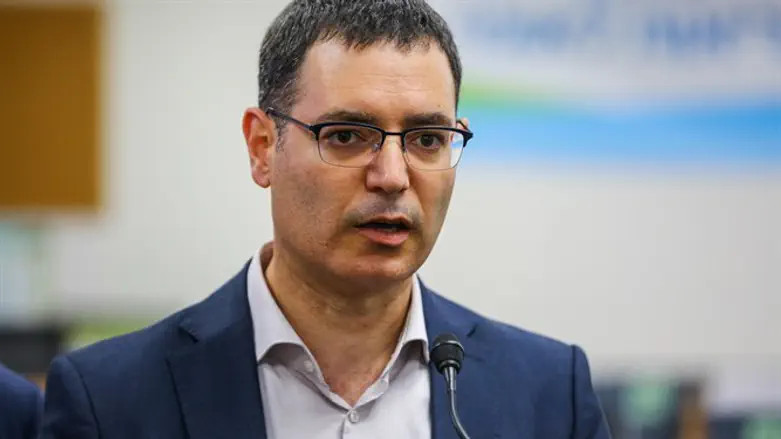
Former director-general of the Health Ministry Moshe Bar Siman Tov was characteristically cautious when addressing the ongoing coronavirus crisis this week. Interviewed by journalist Nadav Eyal, he began by stressing that he has no intention of telling his successors what to do.
“The first thing I want to emphasize is that I don’t want to give advice to those currently on the front lines of dealing with this epidemic,” he insists. “I know how hard they work, and how dedicated they are to the job.”
Nonetheless, given the opportunity to put forward his views, he emphasizes that, “Israel is at a critical point right now, and I think that not enough people realize that. That’s why I agreed to speak out.
“It seems to me that people are literally getting fed up with hearing about coronavirus,” he continues. “They would rather not know. But unfortunately, none of the predictions that the epidemic would simply disappear have come to pass, and so we do have to keep talking about it.”
Bar Siman Tov admits that, “It really is hard to sustain the effort and keep to the regulations for such a long period of time, for months on end. But there’s simply no choice. Coronavirus is here with us. If we don’t manage to get the infection rate down significantly before winter arrives, the situation is going to get much worse.”
“Much worse?” queries Eyal. “You do realize what that sounds like, don’t you? People can still remember what you said back then, before we locked down –that we would have thousands of people dying otherwise. And here we are now, with over a thousand dead. That’s a lot of people, of course, but there are those who would argue that the economic impact was too high a price to pay. And this is where the argument starts.”
Bar Siman Tov responds: “The regulations we imposed were designed to enable us to find a new modus vivendi with the epidemic – a way of living with coronavirus, if you will, with a price to pay in human lives that is tolerable. That’s what other countries did too. It’s true that we haven’t seen colossal numbers of people dying, but the numbers are going to rise. And as for the economic cost – it’s the same situation more or less everywhere.”
“The Swedes would beg to differ,” Eyal notes, but does not pursue the point. Instead, he suggests: “Let’s focus on the main issue. You managed to get the rate of infection way down, by paying a huge price in economic terms. But then, you failed to prepare the mechanisms for putting the brakes on once the lockdown was eased. And so from forty new cases per day, we’ve reached thousands. Where did you go wrong? Or alternatively, if you like – what could you have done differently?”
“In my opinion, the main issue was and is one of finding a way to live with the coronavirus,” Bar Siman Tov responds. “This is what we have seen happen in countries that have been successful in keeping the rate of infection down, and where we have had less success. We reopened schools too quickly, and allowed events to be held again too soon. Once we realized our mistake, we took steps to correct it. I would just note as an aside that in Sweden, the schools are far less crowded than ours, as they have few children [per capita], and they also don’t have the types of events we have.”
Eyal persists: “Let’s focus on the central issue here. The main complaint against the government’s handling of the crisis is that you didn’t build up a system that would keep people safe so that we wouldn’t have to go back to lockdown. And it’s really a criticism of you specifically, given that you were one of the key people in charge at the time.”
“We did make a start at creating mechanisms,” Bar Siman Tov defends himself, “but this wasn’t something that could be achieved overnight, and unfortunately, one cannot rely on miracles. And we were hampered by the very nature of the disease itself, which made things much more difficult to deal with. I’m referring to the fact that for each confirmed diagnosis, there are another one to three that we never find out about, because they are asymptomatic cases. This makes any system for cutting the chains of transmission very limited in its capabilities.”
Eyal then changes course: “So let’s talk about now. What would you be doing today if you were still in charge? Do you think we need to take measures on a national scale?”
Bar Siman Tov responds: “In my opinion, one of the most important things to stress is that we should be fighting the disease and not each other. Israel is basically one unit, like one epidemiological cell. That doesn’t mean that we can’t use localized measures, and indeed, we took many steps on a local scale during the first wave. But even so, we have to recognize the limitations of such methods.
“That said,” he continues, “I think that there are some things that are being done today that are less than advisable. The spike in the number of cases we’re seeing now is a result of reopening the schools and it’s going to get worse. Then the festivals, and the winter… I would focus on the education system, on events, and on getting through the festival season in one piece.”
Eyal asks: “What I understand from your response is that you would like to see the schools shut. Don’t you think that the regional approach – the traffic light program – is going to work?”
“I do think that we need to do what we can to keep preschools and the lower grades of school open,” Bar Siman Tov replies. “But classes for the middle and upper grades should be cut back as far as possible. As for the regional approach, once we get into the details, it becomes much more complicated. What about teachers who work in more than one town, for instance? This is a very common occurrence.”
“I hear you. So, when do you think the government should impose a lockdown – if at all? Or do you think we can continue with strict restrictions and avoid a total closure? How many serious and moderate cases can we absorb?”
“The breaking point is when the health system can’t cope,” Bar Siman Tov clarifies. “But obviously we have to take action before we reach that point. So how do we know when? There’s no clear-cut answer to that question, but it’s clear that once winter arrives, things are going to get tougher. We have to ensure that we don’t reach a situation in which we don’t have sufficient medical personnel to treat each patient – that would be a catastrophic situation.”
Eyal asks: “I’m going to press you – there are those who say that we can carry on like this without restrictions and in the worst-case scenario, we’ll have hundreds of serious cases – and that’s better than lockdown. When do we get to the point where we admit that it’s not working anymore?”
Bar Siman Tov responds: “The health system can cope with around 800 serious cases simultaneously, but less during the winter, and more if we stop doing scheduled operations. What does it actually mean to have hundreds of serious cases? It means hundreds more people dying.”
Eyal asks: “I remember us discussing the crisis during the first wave, and you explained that in an emergency situation, we needed to marshal our resources and pull together – otherwise, everything falls apart and everyone has his own opinion. Isn’t that what’s happening now?”
“I think we lost the ability to make quick decisions,” says Bar Siman Tov, “which is tremendously problematic. The other important ability that we seem to be lacking is that of engaging with the public in a complex dialogue. One of the things that made it more difficult to have that dialogue was the fact that certain experts inserted themselves into the picture without truly comprehending what the picture consists of. And once the government stopped speaking in one voice, various negative consequences were inevitable.”

